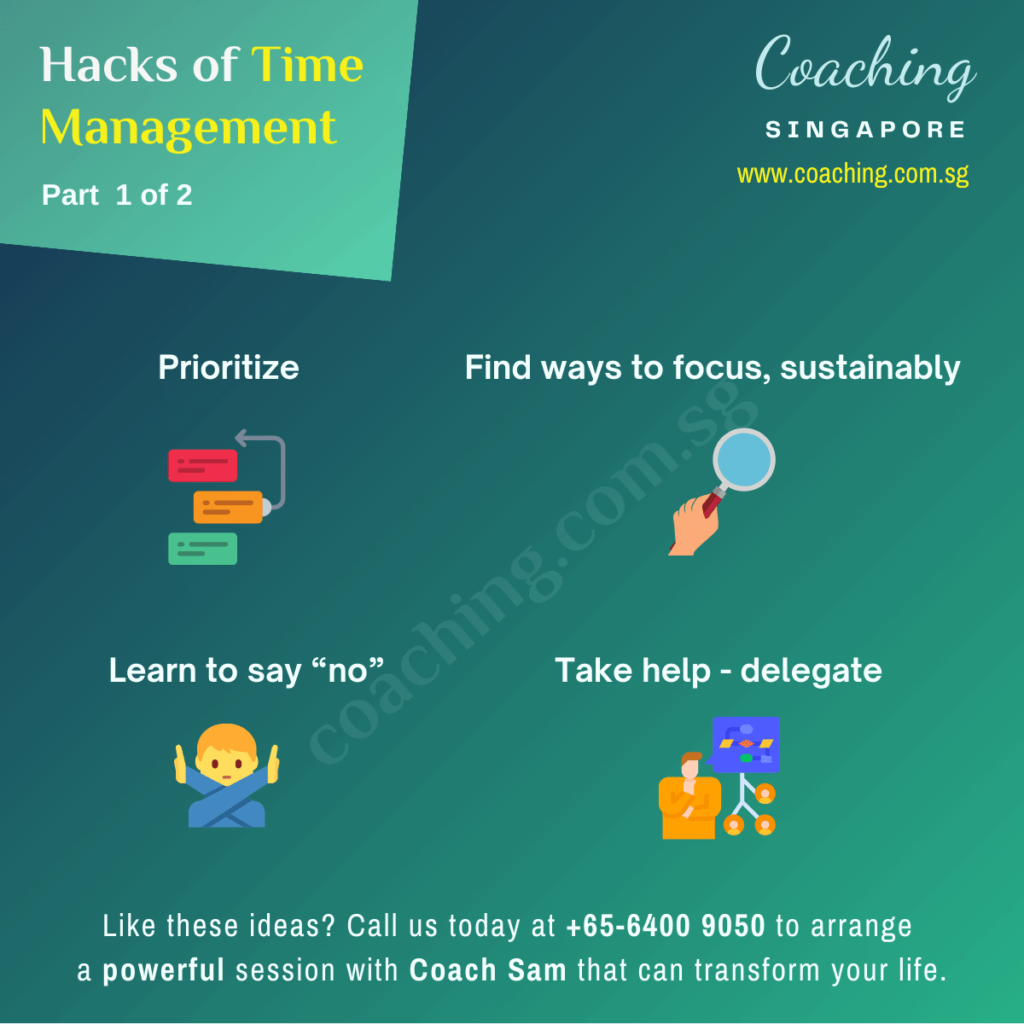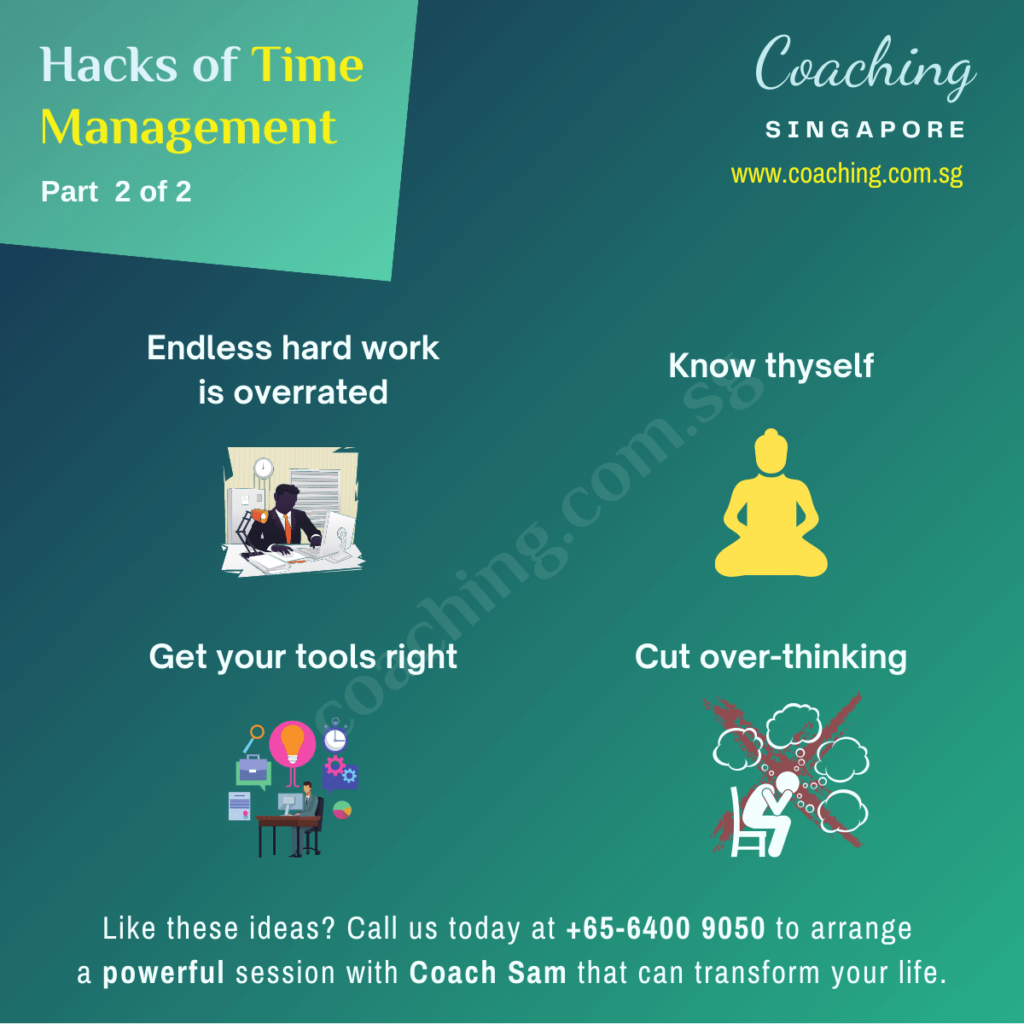Home » Mental Resilience » A perspective on time management: 9 hacks that help you achieve more with less
A perspective on time management: 9 hacks that help you achieve more with less

- Author: Coach Sam
Time is our greatest resource.
We all have exactly the same amount of time every day – 24 hours. Once gone, it never comes back.
It is the cause of unstoppable change – within and without us.
That is why it is so very crucial to have a strategic mindset about how we plan to spend our time.
For that, we must look at what the near and distant future looks like, and how we wish to navigate it.
We harness our motivation for our goals, and then good common sense to select which projects we should allocate ourselves to day-to-day.
Without this step above, we greatly reduce our chances of success – like throwing something at a wall and hoping that it sticks.
Closely linked to time is how well we feel each minute that we are awake – the satisfaction of living.
The journey is as meaningful as the destination.
1. Prioritize
Ask yourself – what is urgent, what is important, and what is neither.
The most fundamental premise of effective time management is differentiating what is important and what is urgent.
Note that the most important tasks are not always the most urgent tasks and vice-versa.
And some of the easiest things to do – watching TV, playing video games, binging on social media, or chatting with friends maybe neither urgent nor important.
One can spend time on these only if they are particularly refreshing, or you are a professional in those fields.
The problem that most of us face is that we let urgent tasks dominate our lives.
Focusing on what you want to accomplish, will give you full control over your time.
The easiest way to prioritize your tasks is to make a to-do list on a daily, weekly, and/or monthly basis, depending on your lifestyle.
Rank the items in your list on the basis of priority as high, medium, and low.
Execute and mark off the highest priorities first.
2. Find ways to focus, sustainably
We all try to do too much all at once and end up achieving almost nothing.
The people who try to accomplish multiple goals at a time were less dedicated and had fewer chances to succeed than those who keep themselves focused on a single goal at a time.
Successful people concentrate on just one thing at a time, as far as possible.
This does not mean doing only one thing day in and day out – that approach is also not very good for optimal productivity, and can lead to “the task stretching to fill the time”.
But it does mean being 100% in the moment of execution – whether that is 10 minutes (for example writing an email or short article) or several hours (performing a surgery).
3. Learn to say “no”
Unless something truly important comes to you, practice saying ‘no’ to the tasks that you feel pressured with – or just don’t think is the right thing to do.
Instead, save your energy and concentration on the activities that are important for you and which you enjoy doing.
Being a “yes” man or woman can lead to you getting too much on your plate and becoming overwhelmed with work.
This does no good for anyone.
You will be stressed and your manager will most likely complain about you not getting the work done on time or in an adequate manner.
It is smart to say “no” to tasks you are certain you will be overwhelmed by.
This is not the same as being lazy or scared.
This is knowing your boundaries (after having tested them), and being wise enough to not risk more harm than good.
Better to keep some of your energies in reserve, as a buffer.
4. Take help - delegate
Delegation means identifying if some of your tasks can be handled by others and assigning those tasks to someone else.
Work with using your strengths, outsource the rest.
This will free up some of your time to focus on other core activities.
Select appropriate persons who can assist you by sharing your responsibilities in the best possible way.
This could be mentors, peers, subordinates, family, friends, and even some strangers.
They should have the appropriate skills, interests, experience, and authority required to accomplish the task.
What’s more, you might just be doing them a favor too!

5. Endless hard work is overrated
It is good to have some intensity of output when performing various tasks.
This not only makes us feel good and saves us time, but it may also be needed to get the job done adequately – whether this is cooking up a meal or constructing a building.
But every period of intense work must be proportionally followed by rest, relaxation, and recreation.
Being in a rut is usually self-defeating.
People who work too hard for too long usually face burnouts and mental breakdowns – which is the body’s way of forcing us to take a break.
And much before that, we may be making errors in our judgment on some critical matters – causing much more harm (possibly irreparable) than good.
Examples of this are unsafe reactions when driving our cars back home after work, or a message sent out to a client, boss, or spouse when we are not at our best or an investment decision made in a hurry.
It also causes us to not be “sharp” anymore in our responses.
Good yoga teachers tell us to stop performing certain poses when we are in that tired, “blunt” state, and instead, come back to it when fresh and ready in every way.
In Japan, there is a term called “karoshi”, which means “death from overwork”.
Smart work and “soft work” go far.
Smart work is using all the leverage at our disposal to complete a certain task.
This could be people, tools, and systems – and even ourselves at different times of the day.
Indeed, anything worthwhile in today’s age happens by being smart about it.
This includes studying for an exam, landing a job, buying property, and achieving team goals.
Soft work is simply taking actions at a pace that does not tire us too quickly.
It is the act of choosing to do the few things we can in a day that give us the best results, holistically and sustainable.
After all, this is the only logical way to deploy the finite resource of time – 24 hours a day, 3652 days in a decade – that we all have (I have purposely mentioned a decade here – because we can achieve life-transforming results in just one).
In summation, one can attain great heights as well as a comfortable life if one incorporates healthy amounts of smart soft, and hard work whenever needed.
Such a person, in due time, achieves the victories they wish for.
6. Know thyself
What is:
- your best time of the day,
- people to be around,
- places where you feel alive,
- the attire of comfort and confidence,
- and preferred kind of work you would like to apply yourself to
This is where self-awareness comes in.
You need to know at which time of the day you are most productive, creative, and least distracted.
Getting this right is crucial as you can then manage what tasks to work on and when.
Ideally, the tasks that require the most brain power and thinking should be done within your most productive hours or what is the best time of the day for you.
7. Get your tools right
In today’s world, there usually are several mechanisms that give you leverage to complete your mission at hand with effectiveness.
For example, there is a range of good project management products and systems to help you optimize the use of your resources.
What’s more, they are often relatively inexpensive.
Experiment with a few such structures, and keep the ones that work well for you.
Learn new skills, if you need to, for using those instruments.
Regularly study the marketplace to see what are the best available aids to accomplish what you need – you don’t want to be left behind your competition in this regard.
Lastly, make sure you use those tools to their fullest – some of us are too cautious and careful so as not to “spoil” these assets.
Now, you have your productivity tool kit ready!
8. Cut over-thinking
Sometimes, it helps a great deal to “sleep over it”.
This often produces greater clarity.
Our subconscious minds are actually ‘super-conscious in many ways.
Thinking is the most difficult and energy-consuming (draining) activity.
Think through processes regularly, and rather than ad hoc, randomly.
After that, trust your decisions.
Go ahead and simply work your plan, tracking the results along the way.
This will save you a lot of mental energy and reduce fatigue.
As great sages say, “Never mind”.
You will also have the reputation of being a decisive person.
Over-thinking has the danger of making one fickle-minded.
It also leads us to unreasonably exaggerate or trivialize situations that arise along the way.
Last but not the least, we need to watch out for “analysis paralysis”.
Too many of us have picked up the habit of trying to be perfect.
Now, doing your very best to achieve the greatest quality in what you do is a worthy cause.
But, when we take a step back, we realize, it is smarter to aim for excellence.
Unless your definition of perfect is simply “good enough”, “perfectionism” can be a risky, wasteful, even foolish endeavor.
Let us try to make most decisions in our lives “no-brainers”.

9. Simplify, simplify, simplify
It is human nature (or a result of our education) to often complicate matters that are in essence very black-and-white.
Relating to the point above on perfectionism, when we try to take into account ALL the available factors or information, we find ourselves tangled in a mess.
Things that seem urgent take precedence over actions that are truly important.
This is most common to see in the investment world.
They forget the aphorism “You don’t have to need to put a man on a weighing scale to tell he is fat”.
By that we mean, the simple, obvious facts, when considered after setting aside the “noise” of unnecessary data and complications, are more than sufficient to gauge if an investment is wise or not.
Conclusion:
These were some ideas that will help you manage yourself and your time effectively to achieve the meaningful results that you desire.
I trust and hope you find these principles valuable in your own life. Here’s to your every success in manifesting your good intentions.
Comment: Is there any other hack that you personally use to manage your time effectively?
Do let me know about it in the comment section below, I would love to learn from you & hear your stories.
Share This Post, Choose Your Platform!
